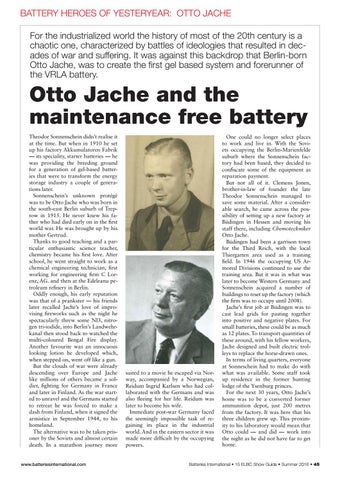BATTERY HEROES OF YESTERYEAR: OTTO JACHE For the industrialized world the history of most of the 20th century is a chaotic one, characterized by battles of ideologies that resulted in decades of war and suffering. It was against this backdrop that Berlin-born Otto Jache, was to create the first gel based system and forerunner of the VRLA battery.
Otto Jache and the maintenance free battery Theodor Sonnenschein didn’t realise it at the time. But when in 1910 he set up his factory Akkumulatoren Fabrik — its speciality, starter batteries — he was providing the breeding ground for a generation of gel-based batteries that were to transform the energy storage industry a couple of generations later. Sonnenschein’s unknown protégé was to be Otto Jache who was born in the south-east Berlin suburb of Treptow in 1915. He never knew his father who had died early on in the first world war. He was brought up by his mother Gertrud. Thanks to good teaching and a particular enthusiastic science teacher, chemistry became his first love. After school, he went straight to work as a chemical engineering technician, first working for engineering firm C Lorenz, AG. and then at the Edeleanu petroleum refinery in Berlin. Oddly enough, his early reputation was that of a prankster — his friends later recalled Jache’s love of improvising fireworks such as the night he spectacularly threw some NI3, nitrogen tri-iodide, into Berlin’s Landwehrkanal then stood back to watched the multi-coloured Bengal Fire display. Another favourite was an innocuous looking lotion he developed which, when stepped on, went off like a gun. But the clouds of war were already descending over Europe and Jache like millions of others became a soldier, fighting for Germany in France and later in Finland. As the war started to unravel and the Germans started to retreat he was forced to make a dash from Finland, when it signed the armistice in September 1944, to his homeland. The alternative was to be taken prisoner by the Soviets and almost certain death. In a marathon journey more
www.batteriesinternational.com
suited to a movie he escaped via Norway, accompanied by a Norwegian, Reidum Ingrid Karlsen who had collaborated with the Germans and was also fleeing for her life. Reidum was later to become his wife. Immediate post-war Germany faced the seemingly impossible task of regaining its place in the industrial world. And in the eastern sector it was made more difficult by the occupying powers.
One could no longer select places to work and live in. With the Soviets occupying the Berlin-Marienfelde suburb where the Sonnenschein factory had been based, they decided to confiscate some of the equipment as reparation payment. But not all of it. Clemens Jonen, brother-in-law of founder the late Theodor Sonnenschein managed to save some material. After a considerable search, he came across the possibility of setting up a new factory at Büdingen in Hessen and moving his staff there, including Chemoteckniker Otto Jache. Büdingen had been a garrison town for the Third Reich, with the local Thiergarten area used as a training field. In 1946 the occupying US Armored Divisions continued to use the training area. But it was in what was later to become Western Germany and Sonnenschein acquired a number of buildings to reset up the factory (which the firm was to occupy until 2008). Jache’s first job at Büdingen was to cast lead grids for pasting together into positive and negative plates. For small batteries, these could be as much as 12 plates. To transport quantities of these around, with his fellow workers, Jache designed and built electric trolleys to replace the horse-drawn ones. In terms of living quarters, everyone at Sonneschein had to make do with what was available. Some staff took up residence in the former hunting lodge of the Ysenburg princes. For the next 30 years, Otto Jache’s home was to be a converted former ammunition depot, just 200 metres from the factory. It was here that his three children grew up. This proximity to his laboratory would mean that Otto could — and did — work into the night as he did not have far to get home.
Batteries International • 15 ELBC Show Guide • Summer 2016 • 45
